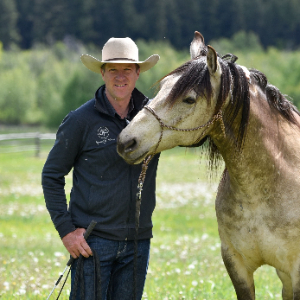Preparing Your Horse for a Zombie Apocalypse!

If the most inexperienced rider you know, had to ride your horse 1000 km to survive a zombie apocalypse - would your horse be ready to carry them?
Now, the reality is, we likely won’t have to be in a zombie apocalypse, but there is value in thinking about how we train our horses to be prepared to do whatever it is we need or want to do.
It seems too often I meet horses whose owners claim to have a set of ‘rules’. Things like, “he doesn’t like white plastic bags” or “ he won’t go over to that side of the arena because he was scared there once”, or “I only ride when it isn’t windy out” or my personal favorite, “she doesn’t like people who wear cowboy hats”! I have heard other versions of this when owners don’t want other people to ride their horse in case they ‘undo all the hard work’ they put into training them. Imagine how limiting that is for the horse if only one person can ride or handle them or they can only function when all factors are exactly in place (no wind, no bags, no scary arena, no cowboy hats….).
Training horses is about preparation; building their skills leading to confidence and competence, proven when anyone can ride them and be safe. This doesn’t mean the horse is dull or so desensitized that they are like robots. It means your horse understands his/her job so well, ANY person can be riding them, not knowing exactly how to ride (like how to manage their seat or reins) and your horse makes up the difference because they know what to do.
And they do so with calmness and with no angst or worry.
This ‘prepare for an apocalypse’ is a mindset we can adopt when training our horses and would be the ultimate test of our teaching!
So where to start?
I cannot count the number of times (thousands, I think) that I have used key principles and Course 1 competencies to assess horses when I handle or ride them. And, I start every single horse with that in mind, no matter their previous training or the owners ‘rules’. .
- Do they understand the Primary Equine Language: neutral, friendly, touch and driving?
- Can I move all 5 body parts; head, neck, shoulders, ribs, hindquarters?
- Can they follow a feel from their halter to their feet?
- Do they clearly understand personal space?
- Can I set the path and speed and they maintain it?
- Do they understand basic aids; direct & indirect rein positions, response to my seat & legs, can they move forward willingly and wantingly, can they turn, can they back up?
- And through all of the above, I consider the 6 C’s; care, control, communication, competence, confidence and challenge (the apocalypse!).
We all need to build our own skills first so we can then develop our horse’s skills, refining them as we practice, using repetition, logging time steadily building competence & confidence.
The development of my whole program is with the horse foremost in my mind. When they are confident in their skills and they function with competence and confidence and are at peace with each situation, I’ll gladly hand my reins over to anyone and watch them start their 1000km ride to survive the zombie apocalypse!
Think of your horsemanship program as a beautiful building you’d like to see standing for many years. It must begin with a well designed and established foundation for its function, its beauty and its longevity. Start at the start and build your foundation first!
As always,
Stay Inspired by Horses!
Not sure where to start? Learn Jonathan's Program: Natural Foundation Set.
Read MORE articles from Jonathan HERE.
Be Better With Horses! Join us with a yearly membership in Open Field
Attend a clinic or Live Event. See Jonathan's full schedule HERE.




